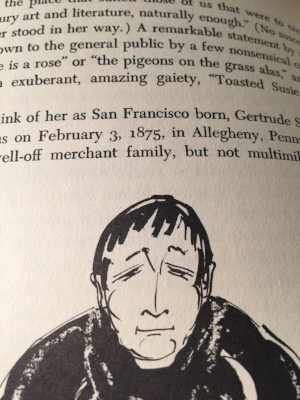I'm as helpless in libraries as I am in bookstores, if not more so. I've yet to leave a library without a book in hand, and frequently it's not the one I was looking for at all, but rather one that caught my eye while I was en route to another title.
So it goes with Stephen Longstreet's WE ALL WENT TO PARIS. Published in 1971, my first impression of it was that it was an earlier, chattier version of Adam Gopnik's AMERICANS IN PARIS, an anthology of Americans writing about their days in Paris.
But WE ALL WENT TO PARIS turns out to be something entirely different--and so, too, Longstreet.
The book is a series of biographical sketches, ranging from Ben Franklin to Richard Wright, written--and illustrated--by Longstreet. He spends a good deal of time on Gertrude Stein, of whom he memorably says, she "seemed to preach 'Don't go home, and all is forgiven.' Paris as a modern American cultural outpost owes much of its popularity to her."
But it's when Longstreet's own autobiography leaks into the text that I was most intrigued. Because Longstreet (1907-2002), knew Stein. And Joyce. And when he returned from Paris, Longstreet collaborated on a film script with "Bill" (William) Faulkner, his carpool buddy, a B-movie for Ronald Reagan. Longstreet, it turns out, was the author of more than 100 books, a screenwriter, and an artist best known for his portraits of jazz artists. He lived, and painted, in Paris in the 1920s, and that may be why those chapters in this book devoted to artists--including more than a few whose names would otherwise be lost to history--are the most affecting in this volume.
WE ALL WENT TO PARIS is definitely worth leafing through--and so is the life of Stephen Longstreet. His Los Angeles Times obituary is respectful; his Independent (UK) one a bit sharper; but leave it to Yale University, one of at least three institutions that holds portions of his papers, to reveal this in its Finding Aid:
Longstreet wrote both novels and non-fiction works. Most of the latter were not reviewed kindly, with reviewers questioning his accuracy of content and reliability of sources. Perhaps his most notable hoax was Nell Kimball: Her Life as an American Madam, by herself, edited and with an introduction by Stephen Longstreet (1970). He claimed to have received a manuscript memoir from Kimball (1854-1934), a well-traveled prostitute and New Orleans madam, tried in vain to find a publisher for it in the 1930s, and then held on to her manuscript when she died. After citing it as primary source material for his own books Sportin' House: a History of New Orleans Sinners and the Birth of Jazz (1965) and The Wilder Shore: a Gala Social History of San Francisco's Sinners and Spenders, 1849-1906 (1968), Longstreet sold the manuscript to Macmillan Publishing. Kimball's autobiography received positive notices in newspapers and mass-market periodicals, but academics found too many close parallels in narrative and language to the works of Herbert Asbury (1889-1963), and shortly, both the text and the madam were found to be Longstreet's fabrications. The Wilder Shore itself was then revealed to have been paraphrased from Asbury's book The Barbary Coast (1933).
Did Macmillan feel burned? Not at all. It published WE ALL WENT TO PARIS just three years later. Who knows how much of it is fabricated? Its devotion to Paris seems entirely authentic.
Gertrude Stein, by Stephen Longstreet
